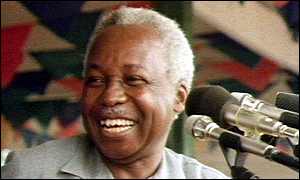MaxShimba
JF-Expert Member
- Apr 11, 2008
- 35,772
- 4,054
- Thread starter
- #61

<SCRIPT type=text/javascript>F.decorate(_ge('photo_notes'), F._photo_notes).notes_go_go_go(2667210725, 'http://farm4.static.flickr.com/3183/2667210725_695d0b75e9_t.jpg', '3.1444');</SCRIPT><FORM style="VISIBILITY: hidden" id=fave_form method=post><INPUT value=3b87ed2b4c6c8954ec693e8a34a762db type=hidden name=magic_cookie><INPUT value=0 type=hidden name=faveadd><INPUT value=0 type=hidden name=faveremove></FORM><!-- PHOTO CONTENT: DESCRIPTION, NOTES, COMMENTS -->
The socialist Nyerere embraced by capitalists! This memorial park has been sponsored by Vodacom, mobile phone provider.
<NOSCRIPT></NOSCRIPT><!-- ############## COMMENTS -->
Would you like to comment


































